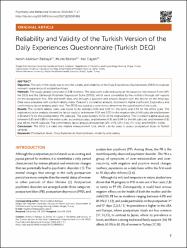Reliability and Validity of the Turkish Version of the Daily Experiences Questionnaire (Turkish DEQ)
Abstract
Objective: The aim of this study was to test the validity and reliability of the Daily Experiences Questionnaire (DEQ) to evaluate women's experience of postpartum blues. Methods: The study sample consisted of 238 mothers. The data were collected using an Introductory Information Form (I I F), the DEQ and the Edinburgh Postnatal Depression Scale (EPDS), which were completed by the mothers through self-reports on the postpartum first, fifth and tenth days and through a question and answer session over the phone on the third day. Data were evaluated with content validity index, Pearson's correlation analysis, Cronbach's Alpha coefficient, Exploratory and confirmatory factor analysis and t-test. The EPDS was used as a criterion to determine the cutoff point of the scale. Results: The content validity index was found to be between 0.86 and 0.99 for the items and 0.93 for the entire scale. The exploratory factor analysis showed the factor loads to be between 0.34 and 0.72 for the negative affect (NA) subscale and between 0.39 and 0.71 for the positive affect (PA) subscale. The scale explains 35.5% of the total variance. The Cronbach's alpha value was between 0.85 and 0.88 for the entire scale, according to days, and between 0.91 and 0.94 for the NA subscale, and between 0.81 and .86 for the PA subscale. The confirmatory factor analysis showed that GFI=0.76, CFI= 0.92, IFI=0.92, and RMSEA= 0.068. Conclusion: The DEQ is a valid and reliable measurement tool, which can be used to assess postpartum blues in Turkish samples.
Source
Journal of Mood DisordersVolume
8Issue
1URI
http://dx.doi.org/10.5455/jmood.20171229065411https://app.trdizin.gov.tr//makale/TXpBNE16RXdNQT09
https://hdl.handle.net/20.500.12809/1666


















